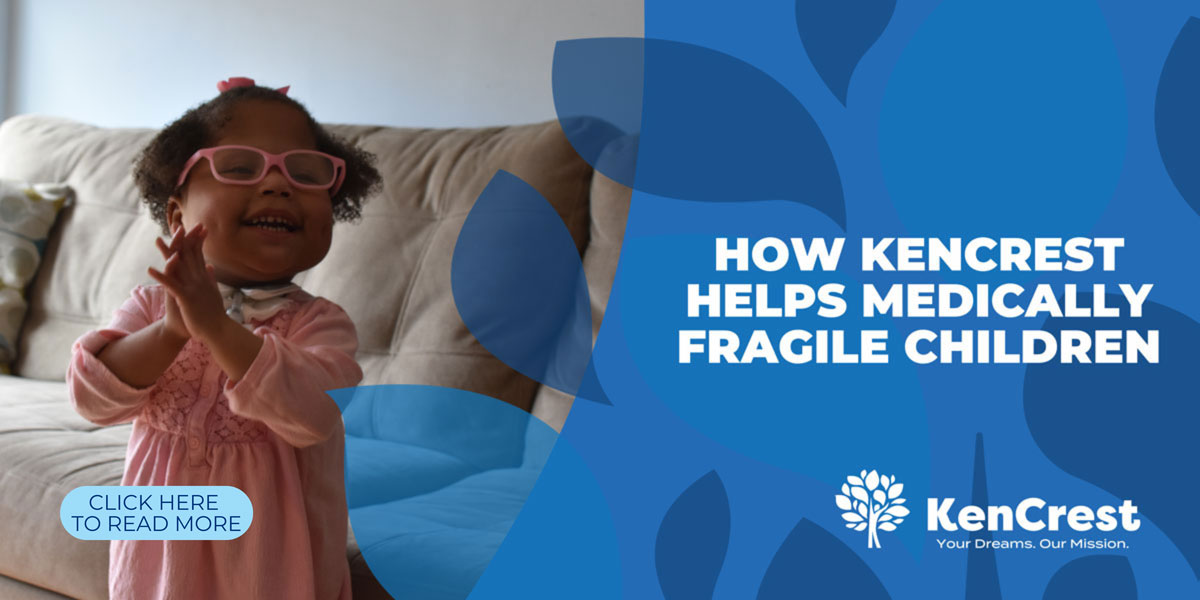

KenCrest’s Medically Fragile Children’s Transitional Homes care for kids with complex medical needs and their parents.
By Sydney Kerelo
Nestled in the trees in a small neighborhood sits one of KenCrest’s Transitional Care Homes for Medically Fragile Children. Designed to care for children with complex medical needs, the Waterman home is a small, ADA-compliant rancher set down a sloping driveway. But the real charm of the house is what’s inside.
When the front door opens, the sound of nursery rhymes and the shaking of toys filter through the air as two KenCrest nurses, a Child Care Worker, and six children sing along as Mickey Mouse dances across the screen. All six children clap and dance along with bright smiles on their faces. Each child is medically fragile and lives at the Waterman home because they require ongoing support beyond what they can receive at home.
“To be medically fragile means that you are not 100 percent healthy, and something is causing you to need more medical attention than your typical child. It means you need medical technology to help improve your health status,” says Nurse Care Coordinator Kate Brown. “We typically take kiddos that are under the age of two and require 24/7 skilled nursing and a need for therapy services. This could be some developmental delay, or they were born premature.”
Many kids at KenCrest’s Medically Fragile Children’s Transitional Homes have tracheotomies, central lines, oxygen and feeding tubes, chromosomal disorders, and neurological conditions that need 24/7 nursing care.
Leylanie clapping in the living room of the Waterman house. // Photo by Aubrey Hoffert
One child in particular, Leylanie Santiago, has been with KenCrest for nearly three years after being discharged from St. Christopher’s Hospital. According to her mother, Christine Santiago, Leylanie was hospitalized for the first year before she was released and transitioned to KenCrest’s Waterman home. And now, she’s the star of the show. With an infectious smile and a bubbly personality, Leylanie captures the heart of every person she meets—especially her nursing staff.
“They love her,” gushes Christine Santiago. “When I originally learned about Leylanie’s medical needs, it was terrifying. She’s my first baby with this many major issues, and when she was getting ready to be discharged from St. Christopher’s, I was going through many personal issues at the time. My home was not ready for her yet, so I talked with her doctors about other options, and they mentioned KenCrest.”
Santiago was connected to a representative and was given a home tour where she met all the nursing staff. After the tour, she knew this was the right fit for her daughter.
In addition to 24/7 nursing care, Leylanie receives physical, occupational, and music therapy. Plus, the nursing staff taught Santiago how to set up her feeding tube, administer her medication, and learn all about trach care.
RELATED: A Home For Medically Fragile PA Children
“The first time we did trach care, the nurses would do it first, and then they would have us do it while they watched,” says Santiago. “One of my biggest worries was how to operate the ventilator, and they were very detailed. They even brought in someone from respiratory to break it all down for me and show me every detail about the machine, which made it so much easier for me to feel confident doing it myself.”
The Waterman house is just one of two KenCrest Medically Fragile Children’s Transitional Homes in Chestnut Hill and Philadelphia, PA, licensed by the Pennsylvania Department of Health as Intermediate Care Facilities (ICF). But it’s so much more than that. It’s a home where children feel loved and safe, and parents feel supported.
“I never miss a beat because of them now, and I appreciate KenCrest for everything they’ve done for me and my family,” says Santiago.
Are you interested in learning more about KenCrest’s Medically Fragile Children’s Transitional Homes? Click the link below!
